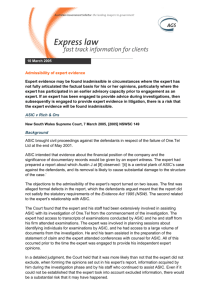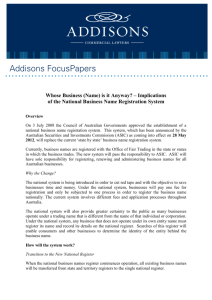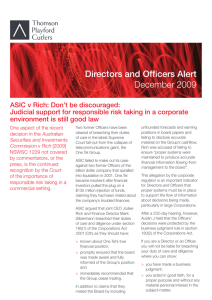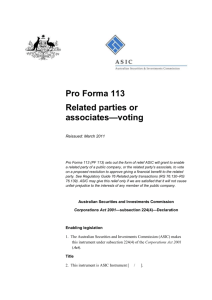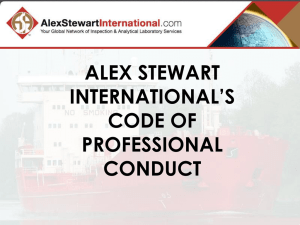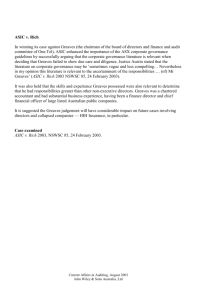View Printable PDF
advertisement
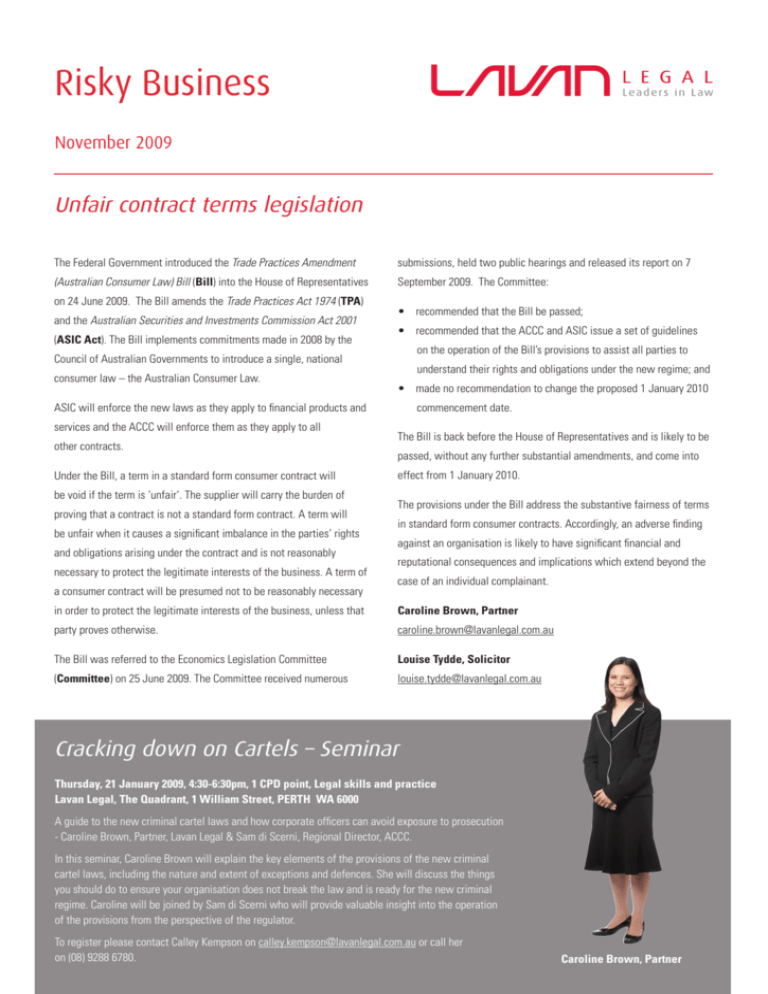
Risky Business November 2009 Unfair contract terms legislation The Federal Government introduced the Trade Practices Amendment submissions, held two public hearings and released its report on 7 (Australian Consumer Law) Bill (Bill) into the House of Representatives September 2009. The Committee: on 24 June 2009. The Bill amends the Trade Practices Act 1974 (TPA) and the Australian Securities and Investments Commission Act 2001 (ASIC Act). The Bill implements commitments made in 2008 by the • recommended that the Bill be passed; • recommended that the ACCC and ASIC issue a set of guidelines on the operation of the Bill’s provisions to assist all parties to Council of Australian Governments to introduce a single, national consumer law – the Australian Consumer Law. understand their rights and obligations under the new regime; and • made no recommendation to change the proposed 1 January 2010 commencement date. ASIC will enforce the new laws as they apply to financial products and services and the ACCC will enforce them as they apply to all other contracts. Under the Bill, a term in a standard form consumer contract will be void if the term is ‘unfair’. The supplier will carry the burden of proving that a contract is not a standard form contract. A term will be unfair when it causes a significant imbalance in the parties’ rights and obligations arising under the contract and is not reasonably necessary to protect the legitimate interests of the business. A term of a consumer contract will be presumed not to be reasonably necessary The Bill is back before the House of Representatives and is likely to be passed, without any further substantial amendments, and come into effect from 1 January 2010. The provisions under the Bill address the substantive fairness of terms in standard form consumer contracts. Accordingly, an adverse finding against an organisation is likely to have significant financial and reputational consequences and implications which extend beyond the case of an individual complainant. in order to protect the legitimate interests of the business, unless that Caroline Brown, Partner party proves otherwise. caroline.brown@lavanlegal.com.au The Bill was referred to the Economics Legislation Committee Louise Tydde, Solicitor (Committee) on 25 June 2009. The Committee received numerous louise.tydde@lavanlegal.com.au Cracking down on Cartels – Seminar Thursday, 21 January 2009, 4:30-6:30pm, 1 CPD point, Legal skills and practice Lavan Legal, The Quadrant, 1 William Street, PERTH WA 6000 A guide to the new criminal cartel laws and how corporate officers can avoid exposure to prosecution - Caroline Brown, Partner, Lavan Legal & Sam di Scerni, Regional Director, ACCC. In this seminar, Caroline Brown will explain the key elements of the provisions of the new criminal cartel laws, including the nature and extent of exceptions and defences. She will discuss the things you should do to ensure your organisation does not break the law and is ready for the new criminal regime. Caroline will beThe joined by Sam di Scerni who will provide valuable insight into the operation Quadrant GPO Box F338, Perth Tel +61 8 9288 6000 of the provisions from the perspective of the regulator. 1 William Street, Perth Western Australia 6841 Fax +61 8 9288 6001 Western Australia on 6000 BX 600-0156 To register please contact Calley Kempson calley.kempson@lavanlegal.com.au or call her on (08) 9288 6780. www.lavanlegal.com.au Caroline Brown, Partner ASIC v Centro Retail Group On 21 October 2009, ASIC filed a civil claim in the Federal Court ASIC also claims that the named directors and executives ‘knew that against eight former and current directors and executives of various the entities had very significant short-term interest bearing liabilities entities within the Centro Properties Group and Centro Retail Group and should have known that these liabilities were incorrectly classified (Centro). ASIC is seeking orders disqualifying the directors and in the 2007 financial reports’. executives from managing companies and is also seeking pecuniary damages of up to $200,000 for each party. Centro is also facing class actions worth up to $1 billion from investors who suffered from the share collapse. Centro joined its ASIC alleges that the former directors and executives breached their former auditors, PricewaterhouseCoopers to the class action who, duties, particularly their duties to ensure that financial reports and in turn, filed a counterclaim alleging that the individual directors and market disclosures were accurate and complied with accounting executives failed to reveal its true debt position. The class actions are standards. This case is the first to be brought under new laws the subject of mediation and will continue alongside the ASIC case. which require the chief executive and chief financial officer to personally sign off on the accounts declaring them to comply with accounting standards. ASIC claims that the 2006-7 financial reports for Centro and its associated entities (the Centro Property Trust and Centro Retail Trust), contained material mis-statements about its debt with a significant amount (more than $2 billion) wrongly classified in its 2006-07 accounts as non-current debt, rather than current. The value of Centro The ASIC case is scheduled to be heard in the Federal Court on 20 November 2009. This case puts directors of other failed companies on notice. The impacts of this case are likely to be far more wide-reaching than ASIC’s proceedings against James Hardie. ASIC is investigating other corporate failures and recently won a court order to freeze the assets and seize the passport of ABC Learning founder, Eddy Groves. shares collapsed by more than 99% from the end of 2007 after the Michael Bruce, Partner company admitted that this debt was in fact due to be repaid much michael.bruce@lavanlegal.com.au earlier. The balance sheets of Centro Properties and Centro Property Trust at 30 June 2007 did not correctly classify $1.514 billion of interest-bearing liabilities as current whilst Centro Retail Trust’s Mona Gill, Solicitor mona.gill@lavanlegal.com.au balance sheet at 30 June 2007 did not correctly classify $598 million of interest-bearing liabilities as current. The Quadrant 1 William Street, Perth Western Australia 6000 GPO Box F338, Perth Western Australia 6841 BX 600-0156 Tel +61 8 9288 6000 Fax +61 8 9288 6001 www.lavanlegal.com.au ASIC v Lindberg On 19 October 2009, civil penalty proceedings brought by ASIC against ASIC’s counsel Mr O’Brien said that by 2003 ‘alarm bells were Andrew Lindberg (Lindberg), the former managing director of AWB ringing’ and ‘red flags were waving’ and while Lindberg had plenty of Ltd (AWB), began in the Victorian Supreme Court. The proceedings are opportunity and the means at his disposal to investigate the nature of one of the biggest and most high-profile commercial cases heard the Fees and put an end to them, he did not. in Australia. ASIC is seeking declarations that Lindberg breached the Corporations Whilst civil penalty proceedings were initiated against six former Act 2001, the imposition of pecuniary penalties and disqualification directors and officers of AWB in late 2007, the proceedings against the from managing a corporation. five other defendants were stayed in November 2008. Following revelations in court that ASIC intends issuing further The civil penalty proceedings concern AWB contracts with the Iraqi proceedings against Lindberg, these proceedings are to be adjourned. Grain Board under the United Nations Oil-for-Food Program, which The proposed further proceedings are likely to focus on Lindberg’s contained payments for purported inland transportation fees (Fees), involvement in the Tigris transaction (a secret deal in which AWB and Lindberg’s role in allowing AWB to make these payments to Iraq. agreed to assist a former senior executive of BHP to recover a The Fees were made to Alia, a Jordanian company partly owned by questionable US$8 million debt from Iraq, via the UN Oil-for-Food the Iraqi Ministry of Transport and were in breach of UN sanctions on Program), Project Rose (AWB’s internal inquiry into the Fees) and the trade with Iraq. Volcker Inquiry (the investigation which, in October 2005, revealed ASIC alleges that Lindberg breached his fiduciary duties to AWB under the Corporations Act 2001 because he: corruption in the UN’s Oil-for-Food Program). Lindberg’s solicitors have sought that these proposed further • knew, or ought to have known, about the AWB contracts that included the Fees; • had obligations to make reasonable inquiries to ensure that AWB complied with obligations under UN sanctions upon trade with Iraq; • was aware, or ought to have been aware, that the Fees were not genuine; and • knew, or ought to have known, that the Fees were, or were likely to be, contraventions of the UN sanctions. proceedings be permanently stayed and Justice Robson has said that he will not hear any witnesses until Lindberg’s solicitors have made their arguments on this application. A decision on Lindberg’s stay application is unlikely to be made until late next month and, if unsuccessful, Lindberg’s solicitors are likely to seek that the two proceedings be heard together. David Sanders, Corporate Counsel david.sanders@lavanlegal.com.au ASIC alleges that through this conduct Lindberg brought AWB into Matthew Knox, Senior Associate serious disrepute, damaged AWB’s share price and its commercial matthew.knox@lavanlegal.com.au standing in the US market, and precipitated the loss in 2007 of AWB’s monopoly rights to export Australian wheat. The Quadrant 1 William Street, Perth Western Australia 6000 GPO Box F338, Perth Western Australia 6841 BX 600-0156 Tel +61 8 9288 6000 Fax +61 8 9288 6001 www.lavanlegal.com.au James Hardie Industries NV – appeal On 23 September 2009, James Hardie Industries NV lodged an appeal For a complete discussion of Justice Gzell’s decision, see the August against the declarations and orders which Justice Gzell made against 2009 edition of Lavan Legal’s Risky Business. it in a decision handed down in the Supreme Court of New South Wales on 27 August 2009. The other defendants with the exception of CEO Peter Macdonald, have also lodged appeals against Justice Gzell’s decision. The appeal is set down for April 2010 and is expected to take three weeks. David Sanders, Corporate Counsel david.sanders@lavanlegal.com.au In Justice Gzell’s decision: • James Hardie was fined $80,000 for breaches of continuous disclosure rules; and Cameron Bill, Solicitor cameron.bill@lavanlegal.com.au • the former James Hardie board members who are appealing the decision, were fined between $30,000 and $75,000 and disqualified from managing companies for between 5 years and 7 years for breaching the Corporations Act 2001, when making misleading statements about the adequacy of an asbestos compensation fund and a corporate restructure in 2003. David Sanders Corporate Counsel, B Juris, LLB, B Com David is Corporate Counsel in the Corporate Services Group. David’s experience is in the area of corporate and commercial law including mergers and acquisitions advice (including Takeovers Panel representation), corporate finance, managed investment schemes, ASX and ASIC compliance and investigations, shareholder meetings and disputes and general commercial advice and documentation. Prior to joining Lavan Legal, David was a Practice Executive at Bennett & Co. Areas of expertise • Mergers, acquisitions and restructures • Corporate finance • Shareholder disputes • ASIC Investigations • Corporations Act and ASX Listing Rules compliance • Takeovers Panel • Managed investment schemes • General commercial law Quadrant GPO Box F338, Perth Direct Tel: 08 9288 6906TheEmail: david.sanders@lavanlegal.com.au 1 William Street, Perth Western Australia 6000 Western Australia 6841 BX 600-0156 Tel +61 8 David 9288 6000 Sanders, Corporate Counsel Fax +61 8 9288 6001 www.lavanlegal.com.au

